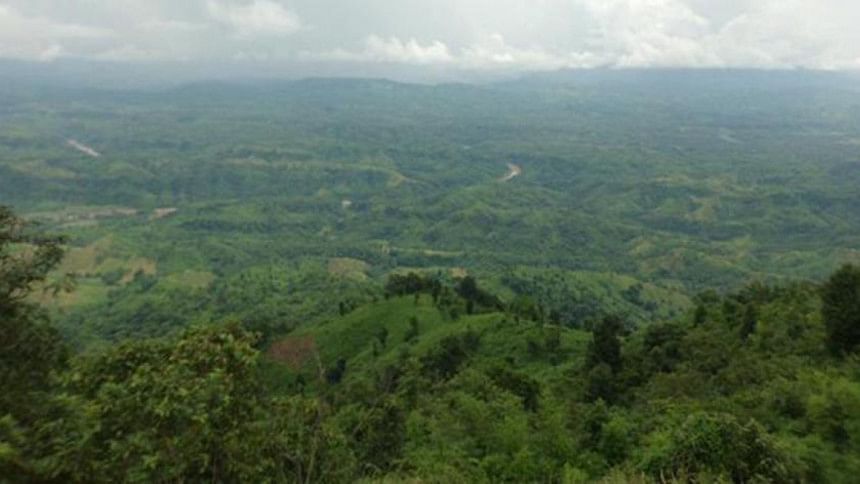Land Disputes in Cht: 22,000 complaints gather dust

It has been more than three years since Bakul Chakma filed a complaint with the CHT Land Dispute Resolution Commission in February 2016. He accused some Bangalees of grabbing two acres of his farmland and a three-acre homestead.
Bakul said he was given an acknowledgement slip on the receipt of the application back then, but he is yet to get any letter or notice over progress of the matter.
“I filed the petition with the hope that I will get my land back,” said the resident of Khagrachhari’s Matiranga upazila. “But there has been no progress in all these years. How long will I have to wait to get the commission’s decision?”
In fact, this same question is being asked by thousands of people who have filed around 22,000 complaints with the commission since its inception in 1999.
Officials say the commission failed to settle a single dispute in all these years because the government has not formulated the rules of business, to allow the commission to recruit people and exercise its jurisdiction.
Indigenous leaders of Chattogram Hill Tracts (CHT), where land disputes remain a hot-button issue, blame the government’s lack of political will for the situation.
The commission was constituted in line with the CHT Accord signed in 1997 between the then Awami League government and regional political party Parbatya Chattogram Jana Samhati Samiti (PCJSS). The treaty brought an end to bloody conflicts in the three hill districts -- Rangamati, Khagrachhari and Bandarban.
In 2001, the government enacted the CHT Land Dispute Resolution Commission Act, stating that the judgment by the commission shall be deemed as a decree of a civil court, and appeal or revision cannot be filed with any court or any other authority, nor can questions be raised about the judgment’s validity or accuracy.
The act also has a provision that the government will prepare the rules of business and publish it as a gazette notification within six months.
In the meantime, the commission has kept seeking the rules of business. In January 2017, they even submitted a draft set of rulesto the land ministry.
A year before that, the act was amended incorporating a provision for preparing the rules as early as possible. That too remains only on paper.
Meanwhile, the fate of many people hangs in the balance due to the commission’s inability to settle disputes.
In 1960, when Kaptai Lake was created in Rangamati as part of Karnaphuli hydro-electricity project, 54,000 acres or 40 percent of total cultivable land in the area were submerged, displacing one third of the then population there, according to Parbatya Chattogramer Bhumi Babosthapona O Adivasider Odhikar, a 2019 publication by Kapaeeng Foundation.
Between 1979 and 1984-85, some 200,000 to 450,000 Bengali people were rehabilitated in the region, leading to an “ethnic conflict” and internal displacements. During this period, around 100,000 indigenous people had fled to bordering India, but many of them returned to the country in the 1990s, according to a book by Chakma Circle Chief Debashish Roy. The book, first published in 2016, is titled Parbatya Chattogramer Bhumi Ebong Parbatyabasir Odhikar O Oitijjo.
According to media reports, the Task Force on Rehabilitation of the Returnee Refugees and Internally-Displaced Persons has identified 21,900 indigenous families of returnee refugees from India. The major land disputes that the commission is tasked with solving involve those who returned from India; the illegally settled and occupied land; and fringe land of Kaptai Lake. The commission shall settle disputes in line with existing CHT rules, customs and practices, says the 1997 accord.
Talking to The Daily Star recently, Kyaw Shwe Hla, a member of the commission, and also chairman of Bandarban Hill District Council, said the absence of the rules was an obstacle to achieving the commission’s prime goal -- settling land disputes.
He, however, said they had already sorted out the complaints based on priority. “We can start work as soon as the rules are ready.”
Sudatta Chakma, additional secretary (development) of the CHT affairs ministry, said the land ministry is formulating the rules. He asked this correspondent to contact the land ministry to know about the progress.
A few days later, on June 27, CHT Affairs Minister Bir Bahadur Ushwe Sing told a discussion in Dhaka that a draft set of rules has been finalised recently, and it will come into effect soon.
Contacted, Kamrul Hasan Ferdous, joint secretary of the land ministry, said they were working on the draft rules.Asked about the delay, he refused to give a direct answer, saying he took charge of the task recently.
Kapaeeng Foundation, an organisation on indigenous rights, said the land commission cannot hear complaints or start the judicial process without the rules.
The government’s lack of political will is to blame for this situation, said Pallab Chakma, the foundation’s executive director. “Perhaps, they are saying that they are committed. But its reflection is absent in their work.”
Referring to the then Awami League administration, Pallab said the AL government now lacks the spirit and enthusiasm it initially had.The party was still in power for about three and a half years after signing of the peace treaty, he said. “Back then, it worked speedily and showed a lot of commitment. Later, it blamed subsequent BNP-led governments for slowing down the implementation process.”
However, the AL is again in power, now for 10-11 years, he said. “The government may have challenges, but it should not take so many years to give priority to one issue.”
Meanwhile, after a meeting of the land commission in February last year, its chairman Justice Anower-ul Haquehad said, “At first we will start working for the refugee people -- those who returned from India.”
After another meeting of the commission in October last year, its member Jyotirindra Bodhipriya Larma (Santu Larma) said the commission could not make progress because it has a shortage of manpower and does not have the rules.
“Twenty-two thousand applications have been submitted from three hill districts. We will start hearing them as soon as the government makes the rules,” he said.
After that meeting, Chakma Circle Chief Debashish Roy said the families who filed complaints are yet to get decisions on their lost land. “I hope the commission will work for solving their problems.”
Contacted, CHT Regional Council Member Gautam Kumar Chakma recently said, “Hopefully, the rules will be formulated soon.”
[Our Khagrachhari correspondent Saikat Dewan contributed to this report.]

 For all latest news, follow The Daily Star's Google News channel.
For all latest news, follow The Daily Star's Google News channel. 




Comments